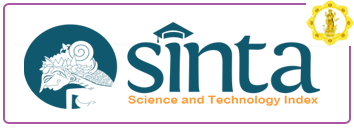Enhancing Students’ Literacy Skills through the use of English Storybooks
Abstract
Basically, education holds a huge influence on the outcome of the students in the process of learning. One obstacle in education today is concerning students’ literacy skill. Most of them possess a low interest in literacy. The strategy that can be adopted to enhance students’ literacy is through the use of storybooks. Numerous storybooks and various activities are provided in order to solve this difficulty, particularly in English education as a foreign language. The storybook can simplify the understanding of the foreign language. The stories are educational materials that provide effective learning with reality, recognition, and entertainment. The objective of this study is to enhance the literacy skills of students by using English storybooks, specifically for young learners and accommodate the widest opportunity for teachers to develop their English teaching abilities in such a way that in the future they are better prepared and alert in dealing with the identical situations.
Keywords
Full Text:
PDFReferences
Araújo & Costa. (2015). Home Book Reading and Reading Achievement in EU Countries: the Progress in International Reading Literacy Study 2011 (PIRLS). Educational Research and Evaluation, 2015. Vol. 21, Nos. 5–6, 422–438, cited on http://dx.doi.org/10.1080/13803611.2015.1111803.
Bay & Cetin. (2017). Storybook Reading Strategies of Preschool Teachers in the USA and Turkey. International Journal of Education and Research. Vol. 2 No. 7 July 2014.
Erkaya, O. R. (2005). Benefits of Using Short Stories in the EFL Context. Asian EFL Journal, 8, 1-13.
Fathurrahman & Astuty. (2018). Journal of English Language Teaching. Volume 5 No. 2, December 2018. Cited on http://ojs.ikipmataram.ac.id/index.php/joelt e-ISSN: 2548-5865.
Habibi & Sofwan, (2018). Teachers of English for Young Learners: An Analysis on Their English Proficiency and Profile. Cited on: https://www.researchgate.net/publication/324184294.
Iriantara, Yosal. 2009. Literasi Media: Apa, Mengapa, dan Bagaimana. Bandung: Simbiosa Rekatama Media.
Karabacak. (2014). The Effect of Using English Story Books in English Courses by Adapting Them to Different Activities on the Foreign Language Success of the Students. IETC 2014. Procedia - Social and Behavioral Sciences 176 ( 2015 ) 1028 – 1033 Language Complexity. The Elementary School Journal, 85(5), 646-661.
Kern, Richard (2001). Literacy & Language Teaching. Oxford: Oxford University Press.
Morrow, L. M. (1985). Retelling Stories A Strategy for Improving Young Children’s Comprehension, Concept of Story Structure, and Oral.
Oktarina, (2018). Innovative Teaching Strategies for Teaching Reading: Reciprocal Teaching Strategy and Face Story Strategy. JOELE. Vol 1, No 1 (2018).
Senechal, M., & LeFreve, J. (2002). Parental Involvement in the development of children’s reading skill: a five-year longitudinal study. Child Development, 73, 445-460.
Susanto, Ahmad. 2014. Perkembangan Anak Usia Dini: Pengantar Dalam Berbagai Aspeknya. Jakarta: Kencana Prenadamedia Group.
DOI: https://doi.org/10.25078/yb.v1i1.1380
Refbacks
- There are currently no refbacks.
Yavana Bhasha : Journal of English Language Education is indexed by

Yavana Bhasha : Journal of English Language Education site and its metadata are licensed under CC BY-SA



